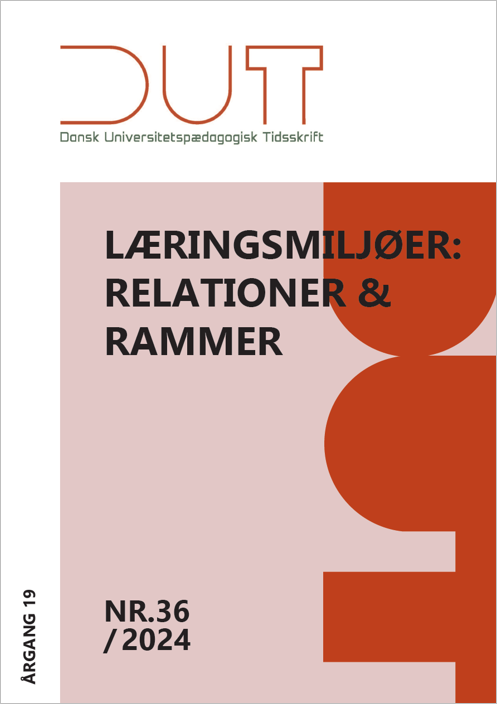Når kunstig intelligens bliver en del af vejledningsrummet
DOI:
https://doi.org/10.7146/dut.v19i36.140339Resumé
Abstract
Generativ kunstig intelligens (GAI) er en helt ny aktør i vejledningen, som potentielt påvirker både vejledningens genstand, arbejdsprocesser og relationer. For vejledningsrummet udvides med en teknologi, der kalder på en genforhandling af, hvad vi i en uddannelseskontekst forstår ved begreber som originalitet, skrivning og plagiat (Dehouche, 2021; Anson, 2022). Samtidig påvirkes også den relationelle og interpersonelle dimension af vejledningen (Nordentoft et al., 2020) i det øjeblik, hvor tekster, tekstfeedback og anden kommunikation mellem vejleder og vejledte helt eller delvist genereres af kunstig intelligens. For at kunne navigere i dette udvidede vejledningsrum må vejledere forholde sig bevidst og reflekteret til egne og studerendes handlemuligheder - og til implikationerne for fremtidens vejledning.
Referencer
Ankersborg, V., & Pogner, K. H. (2022). Conform, transform, resist: The Scandinavian way of master's thesis supervision and its contribution to acquiring research literacy and practice. In Negotiating the Intersections of Writing and Writing Instruction (pp.195-231). The WAC Clearinghouse/University Press of Colorado. https://doi.org/10.37514/INT-B.2022.1466.2.07
Anson, C. M. (2022). AI-based text generation and the social construction of "fraudulent authorship": A revisitation. Composition Studies, 50(1), 37-46.
Anson, C. M., & Straume, I. (2022). Amazement and Trepidation: Implications of AI-Based Natural Language Production for the Teaching of Writing. Journal of Academic Writing, 12(1), 1-9. https://doi.org/10.18552/joaw.v12i1.820
Dehouche, N. (2021). Plagiarism in the age of massive generative pre-trained transformers (GPT-3). Ethics in Science and Environmental Politics, 21, 17-23. https://doi.org/10.3354/esep00195
Gimpel, H. et al. (2023). Unlocking the power of generative AI models and systems such as GPT-4 and ChatGPT for higher education: A guide for students and lecturers (No. 02-2023). Hohenheim Discussion Papers in Business, Economics and Social Sciences.
Ibrahim, H., Liu, F., Asim, R. et al. (2023) Perception, performance, and detectability of conversational artificial intelligence across 32 university courses. Sci Rep 13, 12187. https://doi.org/10.1038/s41598-023-38964-3
Introna, L. D. (2016). Algorithms, governance, and governmentality: On governing academic writing. Science, Technology, & Human Values, 41(1), 17-49. https://doi.org/10.1177/0162243915587360
Jensen, T. W. 2023. Wiping away the stain: From "plagiarism checkers" to AI-assisted "plagiarism removers" and the implications for students' understanding of academic writing. European Association for the Teaching of Academic Writing conference, Writing technology, thinking, and learning, Schweiz 2023. Konferenceoplæg m. peer reviewed abstract.
Jensen, TW; Bay, G, & Andersen, P. (2017). Udvikling af studerendes akademiske skrivekompetencer - en model for en indsats på fakultetsniveau. Dansk Universitetspædagogisk Tidsskrift, 12(22). https://doi.org/10.7146/dut.v12i22.24232
Jensen, TW & Bay, G. (2019). Non-cheater or taking part in the disciplinary dialogue? The impact of plagiarism software on the development of students' authorial identity. EATAW 2019, 10th Conference of the European Association for the Teaching of Academic Writing, Gøteborg, Sweden. Konferenceoplæg m. peer reviewed abstract.
Jensen, TW & Bay G. (2018). Nu siger jeg bare ikke noget selv - plagiatkontrolprogrammers oversete negative effekter på universitetsuddannelserne. Revy, NO: 4, 7-9.
Jensen, TW & Bay G. (2018). Mellem angsten for plagiatanklager og kravet om selvstændighed: Uintenderede effekter af plagiatprogrammer. Dansk Universitetspædagogisk Konference, 2018. Konferenceoplæg m. peer reviewed abstract.
Kaplan-Rakowski, R., Grotewold, K., Hartwick, P., & Papin, K. (2023). Generative AI and Teachers' Perspectives on Its Implementation in Education. Journal of Interactive Learning Research, 34(2), 313-338.
Lim, W. M., Gunasekara, A., Pallant, J. L., Pallant, J. I., & Pechenkina, E. (2023). Generative AI and the future of education: Ragnarök or reformation? A paradoxical perspective from management educators. The International Journal of Management Education, 21(2). https://doi.org/10.1016/j.ijme.2023.100790
Malmström, H., Stöhr, C., & Ou, A. W. (2023). Chatbots and other AI for learning: A survey of use and views among university students in Sweden. Chalmers Studies in Communication and Learning in Higher Education 2023:1, 1-19.
Mulholland, M. (2020). Honor and shame: Plagiarism and governing student morality. Journal of College and Character, 21(2), 104-115. https://doi.org/10.1080/2194587X.2020.1741394
Nordentoft, H & P. Cort (2020). Specialevejledning på videregående uddannelser. Pædagogisk Indblik; Nr. 7, Aarhus Universitet, 1-41.
Weber-Wulff, D. et al. (2023). Testing of detection tools for AI-generated text. International Journal for Educational Integrity, 19(1), 26, 1- 39. https://doi.org/10.1007/s40979-023-00146-z
Wichmann-Hansen, G. & Jensen, T.W. (2013). Processtyring og kommunikation i vejledningen i L. Rienecker et al. (red), Universitetspædagogik. Samfundslitteratur, Frederiksberg, 329-350.
Rudolph, J., Tan, S., & Tan, S. (2023). ChatGPT: Bullshit spewer or the end of traditional assessments in Higher education?" Journal of Applied Learning and Teaching, 6(1), 342-363. https://doi.org/10.37074/jalt.2023.6.1.9
Sadasivan, V. S., Kumar, A., Balasubramanian, S., Wang, W., & Feizi, S. (2023). Can ai-generated text be reliably detected? Preprint arXiv: https://doi.org/10.48550/arXiv.2303.11156.
Sharples, M. (2022). Automated essay writing: an AIED opinion. International Journal of Artificial Intelligence in Education, 32(4), 1119-1126. https://doi.org/10.1007/s40593-022-00300-7
Zwagerman, S. (2008). The scarlet P: Plagiarism, panopticism, and the rhetoric of academic integrity. College Composition and Communication, 59 (4): 676-710. https://doi.org/10.58680/ccc20086674
Downloads
Publiceret
Citation/Eksport
Nummer
Sektion
Licens
DUT udkommer elektronisk via Statsbibliotekets Open Journal System (Tidsskrift.dk) og DUNs hjemmeside (DUN-net.dk) forår og efterår. Det er gratis og frit tilgængeligt at læse og downloade artikler fra tidsskriftet.
Det er ikke muligt at abonnere på Dansk Universitetspædagogisk Tidsskrift, DUT, men hvis du er medlem af DUN, får du tilsendt en nyhedsmail med link til udgivelsen, når den nyeste udgave er online. Linket vil også være tilgængeligt her på siden, så snart tidsskriftet er publiceret.
© Copyright
Artikler publiseret i Dansk Universitetspædagogisk Tidsskrift, DUT, må bruges (downloades) og genbruges (distribueres, kopieres, citeres) til ikke-kommercielle formål med reference til forfattere og Dansk Universitetspædagogisk Tidsskrift.
Artikler indsendt til Dansk Universitetspædagogisk Tidsskrift må ikke publiseres i andre tidskrifter.
Betingelser
Artikler i Dansk Universitetspædagogisk Tidsskrift, DUT, er omfattet af ophavsretsloven, og der må citeres fra dem.
Følgende betingelser skal dog være opfyldt:
- Citatet skal være i overensstemmelse med „god skik“
- Der må kun citeres „i det omfang, som betinges af formålet“
- Ophavsmanden til teksten skal krediteres, og kilden skal angives ift. ovenstående bibliografiske oplysninger.





